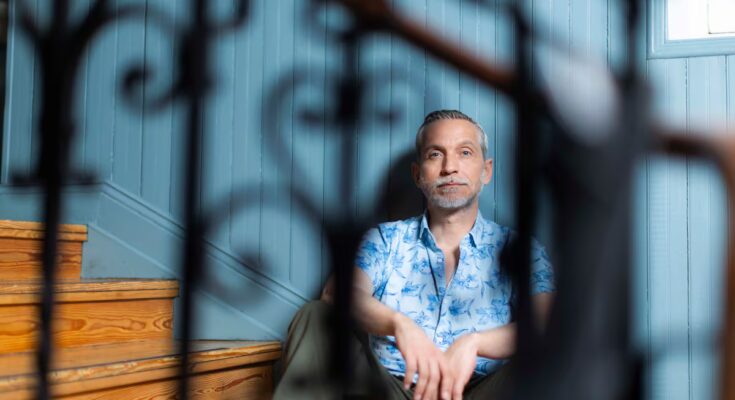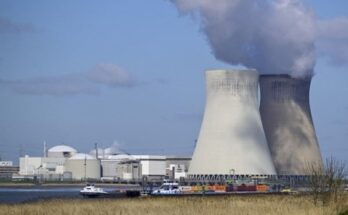In 1939, as the world prepared to descend into the chaos of World War II, a small frozen country resisted the onslaught of the Soviet giant. Three million Finns against 171 million Russians. One hundred and five days of fighting at fifty degrees below zero. This forgotten story is the one that Olivier Norek (Toulouse, 50 years old), former police officer and author of detective novels, saves in The Winter Soldiers (Grijalbo), which has already sold more than 300,000 copies in France. His new work not only revives the so-called Winter War, but turns it into a mirror of the present with Putin’s current aggression. “I didn’t want to write about the war in Ukraine,” says the author, visiting Madrid. “But I wanted to understand it. And to understand it I thought I had to tell a war from a century earlier. Because forgotten history is condemned to repeat itself.”
It all started, he says, one morning in 2022, listening to the radio. “I heard Vladimir Putin threatening us with a nuclear winter. In 2022, no one was prepared for this. Not even me. And when I’m afraid, I investigate. I wanted to understand a century of relations between Russia and the rest of the world, to find out if the past could give me the intellectual weapons to understand tomorrow.” On that journey through history, Norek came across an almost mythical episode: the war that pitted the Soviet Union against Finland between 1939 and 1940. “I found myself with 105 days at minus 51 degrees, and with a gigantic army that was trying to subjugate a tiny country… and failed. And in the center, a man: Simo Häyhä, a farmer five feet seven inches tall, with the face of an angel and a lethal aim, which became the nightmare of “Russia. An unlikely hero. When you come across a story like that, you know you have to tell it.”
The white death
Simo Häyhä, said The White Deathhe is a figure as legendary as he is elusive. His exploits – more than 500 confirmed kills as a sniper – turned him into a living legend, but he never spoke about it. “Simo was a man of few words,” explains Norek. “He gave only one interview to a German newspaper. So I decided to respect his silence: in my novel he doesn’t speak. You only hear him when he describes his rifle. Everything else is told through the eyes of those around him: his companions, his superiors, the soldiers who feared him. That was my way of preserving the mystery.”
In times of exhibitionism and noise, isn’t a silent hero almost revolutionary? “Simo didn’t want to be a hero. He was a farmer who only wanted to take care of his farm. But when they told him that Russia was about to attack his country, he left his life and took up the rifle. First he hunted wolves; then he had to face men. And in that transformation he sublimated himself. It’s what we writers look for in our characters: someone who is not prepared, who doesn’t have the right weapons, but who faces the mission because his cause is right. You don’t choose to be a hero, you become one through your eyes of others.”
When the war ended, Häyhä returned to his farm. “He bought a cow, a horse and an old yellow beetle. He refused journalists. He lived in silence. He only accepted, once a year, a man knocking on his door to go hunting with him. That man was the president of Finland.”
The sublimation of a country
For Norek, the greatness of The Winter Soldiers It’s not just in its protagonist, but in the community. “Not only Simo was sublimated. An entire country was sublimated: the women who sewed the uniforms, the young people who went to the front, the elderly who defended the countries. When you have a just cause, everything else ceases to matter.” This idea runs throughout the book and also through Norek’s thoughts. “During World War II, when Germany attacked Russia, the Soviets resisted because they had a just cause. But when they attacked Finland, they failed, because their cause was unjust. The justice or injustice of a cause determines the inner strength of those who defend it. When you fight for love, for your land, for your people, it is almost indestructible.”
However, Norek’s novel dedicates a lot of space to the Russians. “For me it was essential not to dehumanize the enemy. At the beginning of the book I talk about spilled blood: not Finnish blood, but that of both sides. At a certain point a soldier falls, wants to turn around, but knows that if he does so his own comrades will shoot him. He kneels down, looks at the sky and prays. At that moment it doesn’t matter which side the bullet comes from. If the reader doesn’t know if he is Russian or Finnish, then I did well. Because after all they were all young, brothers, cousins, boys who did not decide that war. Those who govern never send their children to the front.
The cold is not just the setting, but the spirit of the narrative. “I wanted to tell about war, violence and death in a poetic way. Winter, because it is white, because the snow is a cinema screen or a blank page, allows you to tell everything. The snow absorbs blood and turns red. It is another character, a mirror of the soul. And, moreover, its whiteness invites poetry. Horror can only be told with beauty, otherwise it cannot be tolerated.”
Fact and fiction
While The Winter Soldiers is based on real events, Norek insists that his point of view is that of a narrator, not that of a historian. “I wrote a history book with the soul of my detective novels. I didn’t invent anything, I didn’t add heroic deeds, everything I tell is true. I just changed the way I told it. Because for a novelist the essential thing is the human: the characters, the emotions. You can have the best plot twists, but without emotions there is no story.” One of the discoveries that most struck him during the investigations concerned the human side and was an unusual strategy of General Mannerheim, the Finnish commander-in-chief during the war. “He decided that each village would form a fighting unit. It sounds simple, but it was decisive. On your left was your brother, on the right your best friend, in front of you was your cousin. So no one ran away. They didn’t fight for an abstract concept, but for those they loved. It was the first war won thanks to love.”
The Winter Soldiers It is not just a historical novel, but a moral mirror. “I want the reader to remember that wars repeat themselves when we forget. Today, in Ukraine, the same thing happens. The first year we feel excited, the second we send weapons, the third we start to get tired. And the fourth, when we hear ‘Ukraine’, many people yawn. But it’s not just Ukraine defending itself, it’s Europe. If Ukraine falls, if Finland is attacked, we all have a problem.” For this reason, the author insists that diplomacy must get to the bottom: “When words disappear, violence comes. We still have time to debate, to talk. But if that spark lights up, it will set us all on fire. We have never been so close to a Third World War.”



